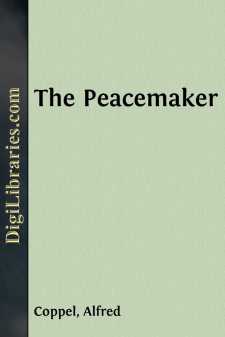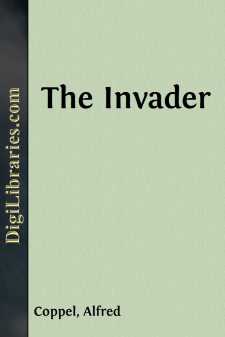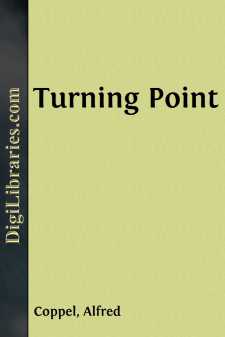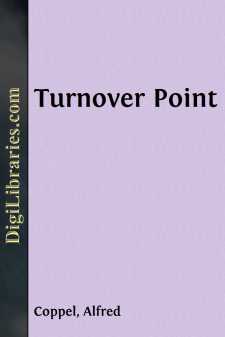Categories
- Antiques & Collectibles 13
- Architecture 36
- Art 48
- Bibles 22
- Biography & Autobiography 813
- Body, Mind & Spirit 142
- Business & Economics 28
- Children's Books 16
- Children's Fiction 13
- Computers 4
- Cooking 94
- Crafts & Hobbies 4
- Drama 346
- Education 46
- Family & Relationships 57
- Fiction 11829
- Games 19
- Gardening 17
- Health & Fitness 34
- History 1377
- House & Home 1
- Humor 147
- Juvenile Fiction 1873
- Juvenile Nonfiction 202
- Language Arts & Disciplines 88
- Law 16
- Literary Collections 686
- Literary Criticism 179
- Mathematics 13
- Medical 41
- Music 40
- Nature 179
- Non-Classifiable 1768
- Performing Arts 7
- Periodicals 1453
- Philosophy 64
- Photography 2
- Poetry 896
- Political Science 203
- Psychology 42
- Reference 154
- Religion 513
- Science 126
- Self-Help 84
- Social Science 81
- Sports & Recreation 34
- Study Aids 3
- Technology & Engineering 59
- Transportation 23
- Travel 463
- True Crime 29
The Peacemaker
by: Alfred Coppel
Categories:
Description:
Excerpt
We humans are a strange breed, unique in the Universe. Of all the races met among the stars, only homo sapiens thrives on deliberate self-delusion. Perhaps this is the secret of our greatness, for we are great. In power, if not in supernal wisdom.
Legends, I think, are our strength. If one day a man stands on the rim of the Galaxy and looks out across the gulfs toward the seetee suns of Andromeda, it will be legends that drove him there.
They are odd things, these legends, peopled with unreal creatures, magnificent heroes and despicable villains. We stand for no nonsense where our mythology is concerned. A man becoming part of our folklore becomes a fey, one-dimensional, shadow-image of reality.
Jaq Merril—the Jaq Merril of the history books—is such an image. History, folklore's jade, has daubed Merril with the rouge of myth, and it does not become him.
The Peacemaker, the chronicles have named him, and that at least, is accurate in point of fact. But it was not through choice that he became the Peacemaker; and when his Peace descended over the worlds of space, Merril, the man, was finished. This I know, for I rode with him—his lieutenant in a dozen and more bloody fights that earned him his ironically pacific laurels.
Not many now living will remember the Wall Decade. History, ever pliable, is rewritten often, and facts are forgotten. When it was gone, the Wall Decade was remembered with shame and so was expunged from the record of time. But I remember it well. It was an era compounded of stupidity and grandeur, of brilliant discovery and grimy political maneuver. We, the greedy men of space—and that includes Jaq Merril—saw it end with sorrow in our hearts, knowing that we had killed it.
If you will think back to the years immediately preceding the Age of Space, you may remember the Iron Curtain. Among the nations of the Earth a great schism had arisen, and a wall of ideas was built between east and west. Hydrogen bombs were stockpiled and armies marched and countermarched threateningly. Men lived with fear and hatred and distrust.
Then, suddenly, came the years of spaceflight and the expanding frontiers. Luna was passed. Mars and Venus and the Jovian Moons felt the tread of living beings for the first time since the dawn of time. The larger asteroids were taken and even the cold moonlets of Saturn and Uranus trembled under the blast of Terran rockets. But the Iron Curtain still existed. It was extended out into the gulf of space, an intangible wall of fear and suspicion. Thus was born the Wall Decade.
Jaq Merril was made for that epoch. Ever in human history there are those who profit from the stupidity of their fellows. Jaq Merril so profited. He dredged up the riches of space and took them for his own. And his weapon was man's fear of his brothers.
It was in Yakki, down-canal from the Terran settlement at Canalopolis, that Merril's plan was born. His ship, the Arrow, stood on the red sands of Syrtis Major, waiting for a payload to the Outer System. It stood among a good many like it: the Moonmaid, the Gay Lady, the Argonaut, and my own vessel, the Starhound.
We, the captains, had gathered in the Spaceman's Rest—a tinkling gin-mill peopled with human wrecks and hungry-eyed, dusty-skinned women who had come out to Mars hoping for riches and had found only the same squalor they had left behind....






